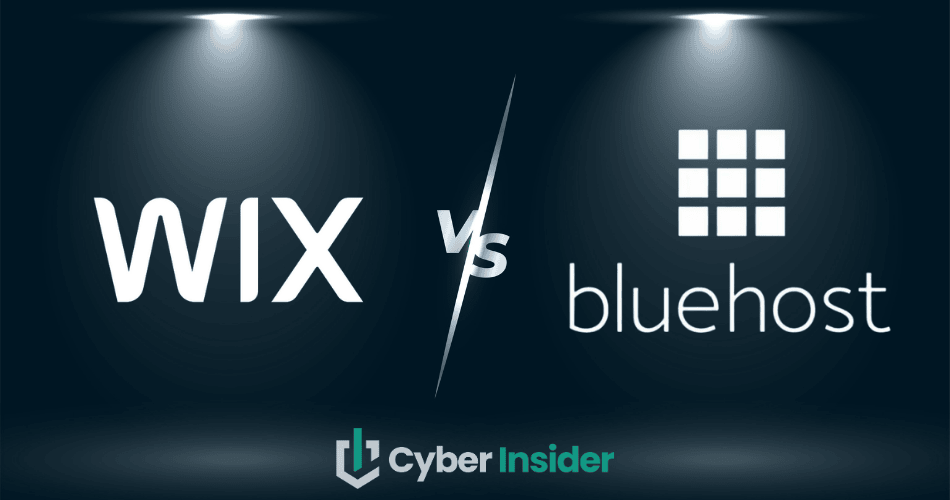
If you’re stuck deciding between Wix and Bluehost, you’re not alone. One gives you a polished, drag‑and‑drop editor that anyone can master, while the other offers raw hosting power and unmatched flexibility, especially for WordPress users. They both have their strengths, but choosing the right one depends on what kind of website you want to build (and how hands-on you want to be).
Want a sneak peek at which one gives you more bang for your buck? Head straight to the pricing battle for a quick look at which platform delivers better value.
But hold up — there’s a lot more to consider than just price. In this guide, we’ll break down everything from features and ease of use to performance, support, and SEO tools. So whether you’re building a portfolio, launching a blog, or setting up shop online, we’ll help you figure out which service is the better fit for your website goals.
| Wix | Bluehost | |
| Website | Wix.com | Bluehost.com |
| Hosting types | Multi-cloud hosting | Shared, VPS, cloud, WordPress, WooCommerce, and dedicated server hosting |
| Pricing | $17 – $159/month | $3.95 – $398.77/month |
| Money-back guarantee | 14 days | 30 days (with shared hosting only) |
| Uptime guarantee | 99.9% | 100% (with cloud hosting only) |
| Server locations | The USA, Ireland, and Israel | The USA, the UK, India, and China |
| 24/7 customer support | ✅ | ✅ |
| Best deal | N/A | 75% off coupon > |
Highlights from our Wix and Bluehost comparison
- Whether you’re a total beginner or a design-savvy creator, Wix makes it simple to build a beautiful website fast — thanks to its intuitive drag-and-drop editor, sleek templates, and all-in-one toolkit.
- Known for its strong performance and deep WordPress integration, Bluehost is ideal for users who want more control and hosting muscle. Curious how it stacks up in speed and uptime? Head straight to our performance comparison!
Overview of Wix and Bluehost
Wix and Bluehost are top contenders in the website world — but they serve different crowds. Wix is all about simplicity, offering a sleek, all-in-one builder that lets you create stunning sites without coding. It’s ideal for creatives, freelancers, and small businesses who want to launch quickly.
Bluehost, on the other hand, shines as a powerful web host, especially if you’re building with WordPress. It’s flexible, reliable, and built for growth — perfect for users who want more control and performance.
Deciding between them? You’re not alone — many users end up comparing Wix vs Bluehost to find the best fit.
Wix: A flexible, all-in-one site builder that delivers

| Starting price | $17/month |
| Hosting types | Hybrid or multi-cloud hosting via Amazon Web Services (AWS), Google Cloud and Wix's in-house server |
| Server types | Cloud-based infrastructure (no Linux or Windows server types) |
| Data center locations | The USA and Ireland |
| Best deal | N/A |
Wix isn’t just another website builder — it’s a platform born from frustration and fueled by the idea that building a great site shouldn’t be a technical nightmare. What began in 2006 as three friends on a beach trying to launch a different startup has grown into a global platform with over 260 million users across 190 countries. Whether you’re launching a personal blog or running a full-fledged online store, Wix gives you the tools to do it — no coding required.
What makes Wix stand out? First, its drag-and-drop builder is so intuitive that anyone can use it. Choose from over 2,000 professionally designed templates, tweak them to your liking, and you’re off to the races. Need more creative freedom? Editor X is built for pixel-perfect design, letting advanced users customize every detail with responsive layouts and modern design tools. And if you’d rather let the tech do the heavy lifting, Wix ADI (Artificial Design Intelligence) can spin up a site for you in minutes — just answer a few questions.
But Wix isn’t just about pretty pages. Under the hood, it packs a serious punch for businesses too. From robust e-commerce tools to appointment scheduling, online bookings, memberships, and SEO optimization, Wix is built to scale with your ambitions. There’s even a built-in logo maker, marketing integrations, and a full suite of AI writing tools to help you fill your site with content, whether you’re a blogger, a brand, or somewhere in between
Reliability and performance also deserve a nod. Wix boasts a 99.98% uptime guarantee, DDoS protection, and a secure infrastructure that helps keep your website running smoothly and safely around the clock. And when it comes to support, Wix offers a massive help center, 24/7 assistance for premium plans, and ongoing platform improvements based on user feedback.
Bottom line? Wix is designed for creators, entrepreneurs, and dreamers who want a professional-looking website without the steep learning curve. It’s not the cheapest platform out there, and some users may find the AI elements a bit overbearing at times. But for sheer ease of use, flexibility, and all-in-one functionality, Wix is hard to beat.
Pros and cons of using Wix
+ Pros
- Over 2,000 customizable templates available
- Beginner-friendly drag-and-drop editor
- Comprehensive built-in SEO tools
- Free cloud hosting with all subscription plans
- Extensive e-commerce tools for businesses
- Robust app market with diverse integrations
- AI tools simplify content creation and design
- Mobile app for site management on the go
- Regular automatic backups for data protection
- SSL certification included
- Uptime guarantee of 99.99%
– Cons
- Templates cannot be switched after selection
- Free plan includes Wix-branded ads
- Limited storage on cheaper plans
- No built-in email hosting in plans
- AI-generated content can lack authenticity
- Paid plans only cover one website
Bluehost: A reliable powerhouse for WordPress and beyond

| Starting price | $3.95/month |
| Hosting types | Shared, VPS, cloud, WordPress, WooCommerce, and dedicated server hosting |
| Server types | Linux-based environments only |
| Data center locations | The USA, the UK, India, and China |
| Best deal | 75% off coupon > |
Bluehost has long been a go-to name in the hosting world, and for good reason. Officially recommended by WordPress since 2006, Bluehost makes launching and managing WordPress sites incredibly easy, with one-click installs, automatic updates, and features designed to help you scale. Whether you’re running a personal blog, a business site, or a full-on e-commerce store, Bluehost gives you the tools to do it all.
But Bluehost isn’t just for WordPress users. Its hosting plans span from shared and VPS to dedicated and managed WordPress hosting, giving you the flexibility to grow at your own pace. Even better, you get helpful extras like a free domain for the first year, SSL certificates, and unmetered bandwidth across all standard plans. Bluehost’s user interface is beginner-friendly without sacrificing the control more advanced users want.
Performance and reliability are two of Bluehost’s biggest strengths. With its primary data center located in Utah, USA, and support for NVMe storage and Cloudflare CDN integration, sites load fast and stay stable, no matter where your visitors are. On the security side, Bluehost includes free SSL, malware protection with SiteLock, and automatic backups to help keep your data safe and sound.
What really rounds things out is Bluehost’s 24/7 customer support. You get access via live chat, phone, or email, and most users report fast, friendly help when it’s needed most. Whether you’re migrating an old site, setting up your first one, or troubleshooting an issue, Bluehost’s support team is ready to step in.
In short, Bluehost is a dependable, budget-friendly host that hits the sweet spot for both beginners and experienced website owners. If WordPress is your platform of choice or you simply want a host that “just works”, Bluehost is a solid bet.
Pros and cons of using Bluehost
+ Pros
- Cheap starting price at $1.99/month
- Free domain registration for the first year
- Free SSL certificate
- User-friendly and sleek interface
- Highly reliable and fast servers
- Convenient website staging area
- Easy-to-use AI website builder
- 1-click WordPress install and recommended by WordPress to boot
- 30-day money-back policy
– Cons
- Renewal rates can be significantly higher
- Basic entry-level plans
- Potential hidden fees
- No uptime guarantee (except for cloud hosting)
Breaking down Wix and Bluehost pricing: From budget-friendly plans to premium perks
Pricing isn’t just about dollars and cents — it’s about what you get for your money. Wix and Bluehost take different routes: one blends creative tools into its plans, the other delivers powerful hosting at bargain rates.
Before choosing your platform, it helps to know what’s under the hood. Here’s a quick overview of the various hosting options each provider offers, from shared plans to cloud-based powerhouses.
| Hosting type | Wix | Bluehost |
| Shared hosting | ❌ | ✅ |
| WordPress hosting | ❌ | ✅ |
| WooCommerce hosting | ❌ | ✅ |
| Cloud hosting | ✅ | ✅ |
| VPS hosting | ❌ | ✅ |
| Game server hosting | ❌ | ❌ |
| Agency hosting | ✅ | ✅ |
| Reseller hosting | ✅ | ❌ |
| Dedicated server hosting | ❌ | ✅ |
Now, let’s break down how their plans compare and which offers better bang for your buck.
Wix pricing plans
Wix makes it easy to get started for free, with a forever plan that requires no credit card. This plan includes 500 MB of storage, 1 GB bandwidth, access to the drag-and-drop builder, and all of Wix’s design templates. The catch? You’ll have Wix branding and ads on your site, and you can’t connect a custom domain.
When you’re ready to upgrade, Wix offers several premium plans tailored to different website needs:
| Wix plans | Price | Core features |
| Light | $17/month | Free domain (1 year), 2 GB storage, multi-cloud hosting, light marketing tools |
| Core | $29/month | Free domain (1 year), 50 GB storage, basic e-commerce, basic marketing tools |
| Business | $39/month | Free domain (1 year), 100 GB storage, standard e-commerce, scheduling |
| Business Elite | $159/month | Free domain (1 year), unlimited storage, advanced e-commerce, developer tools |
Wix’s premium plans are designed to grow with you — whether you’re building a simple site or launching a full-blown online business. The entry-level plan keeps things light, giving you just enough tools to get online quickly, while the next tier is perfect for growing brands that need a bit more muscle — think e-commerce basics and a few extra hands on deck.
If you're setting up an online store, the business plan steps things up with advanced selling tools, better SEO options, and more storage to handle your products and content. And for those running large operations or scaling fast, the top-tier plan unlocks enterprise-level features, unlimited storage, and priority support to keep everything running smoothly.
All plans include a free domain for the first year, multi-cloud hosting, access to AI-powered tools, and 24/7 customer support. Plus, there’s a 14-day money-back guarantee — just in case you change your mind. One heads-up: like with Bluehost, Wix’s prices increase after the first term, so it’s worth checking their renewal prices before locking anything in.
See all Wix price plans here >
Bluehost pricing plans
Bluehost’s shared hosting plans are simple, affordable, and packed with essentials — making them perfect for first-time site builders or smaller businesses:
| Type of hosting | Starting price | Best for |
| Shared hosting | $3.95/month | Beginners or small sites with moderate traffic |
| VPS hosting | $46.99/month | Growing sites needing more speed, power, and control |
| Cloud hosting | $75.00/month | High-traffic sites that need scalability and reliability |
| WordPress hosting | $4.95/month | Users who want an optimized WordPress experience |
| WooCommerce hosting | $7.95/month | Online stores powered by WordPress and WooCommerce |
| Dedicated server hosting | 141.19/month | Large, resource-heavy websites needing max performance |
Bluehost’s shared hosting plans are built to be beginner-friendly but scalable enough for growing sites. The entry-level plan is perfect if you’re just starting out — it includes 10 GB of fast NVMe storage, support for one website, a free domain for the first year, SSL security, and unmetered bandwidth. It’s a solid foundation for small sites or personal blogs.
Step up just a little and you get a lot more with their Choice Plus plan. You’ll unlock daily backups, domain privacy, and the ability to run unlimited websites, making it ideal for freelancers or side hustlers managing multiple projects.
Need more horsepower? The Pro Plan gives your site a boost with optimized CPU resources, faster performance, and a dedicated IP address — great for businesses that expect more traffic or want better control over speed and reliability.
No matter which plan you choose, you’ll get a free domain for the first year, a free SSL certificate, 24/7 support, and a 30-day money-back guarantee — all the essentials for a worry-free start.
And if your site grows beyond shared hosting, Bluehost is ready with more powerful options: VPS hosting for more control, dedicated hosting for resource-heavy sites, managed WordPress hosting for smoother WordPress experiences, and WooCommerce hosting built specifically for online stores.
Want to check current pricing or explore Bluehost’s hosting solutions in more detail?
Visit Bluehost’s pricing page here >
Ease of use: How beginner-friendly are Wix and Bluehost, really?
Not everyone wants to wrestle with code, and thankfully, you don’t have to. Wix and Bluehost both aim to streamline the setup process, but their approaches couldn’t be more different. Choosing between them depends on how hands-on (or hands-off) you want your site-building experience to be.
Getting started: Quick and (mostly) painless
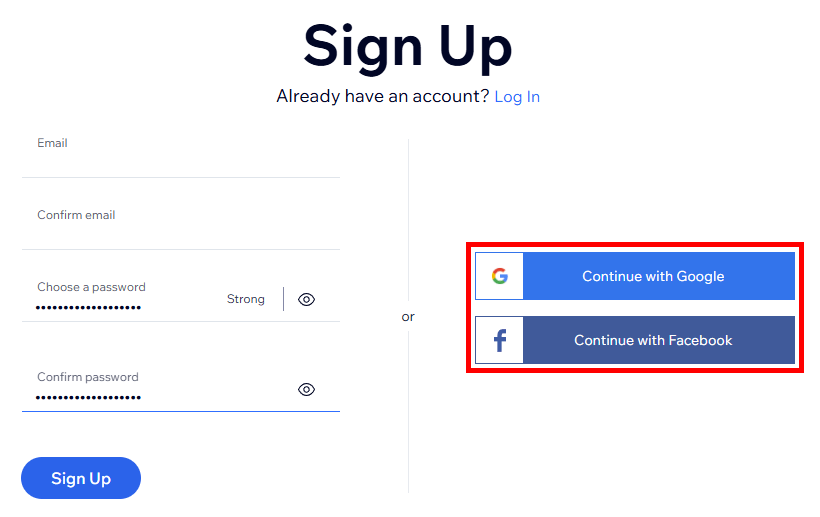
Wix greets you with a slick, modern setup that’s as fast as it is foolproof. Sign up with an email or social login, answer a few questions, and boom — your site is already halfway built using Wix’s AI tool (ADI). You can also start with one of 2,000 templates and tweak it yourself using the intuitive drag-and-drop editor. No confusing terminology, no setup stress — just pick a design and go.
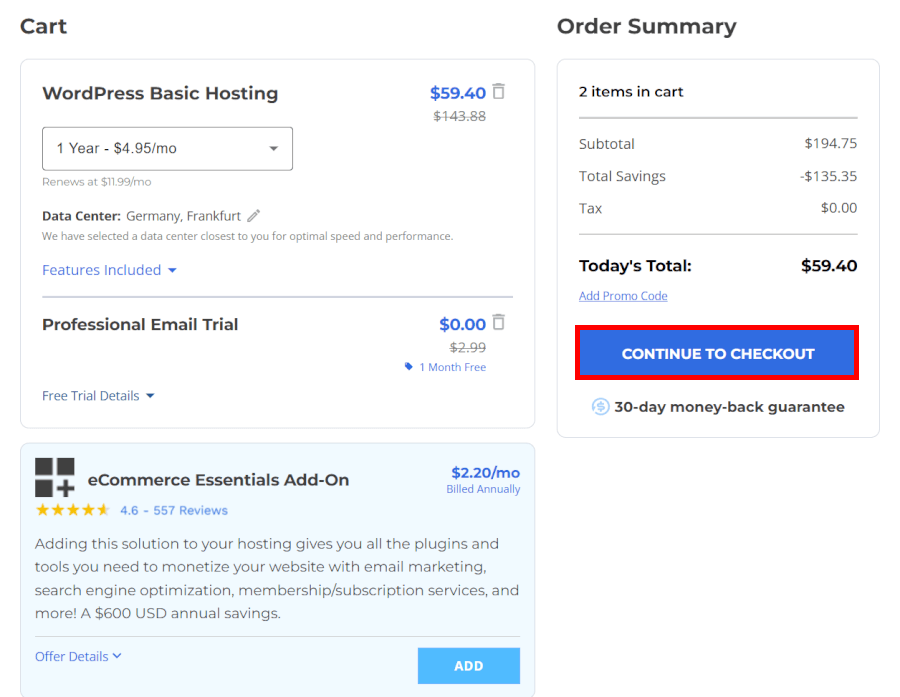
Bluehost, on the other hand, focuses more on hosting and WordPress integration. The onboarding is still smooth: you’ll get a free domain, guided setup, and a walkthrough to help install WordPress. But while it’s beginner-friendly, there’s a bit more manual clicking around involved — especially once you land inside WordPress. If you’ve never used a CMS before, it might take some getting used to.
Dashboards and day-to-day use
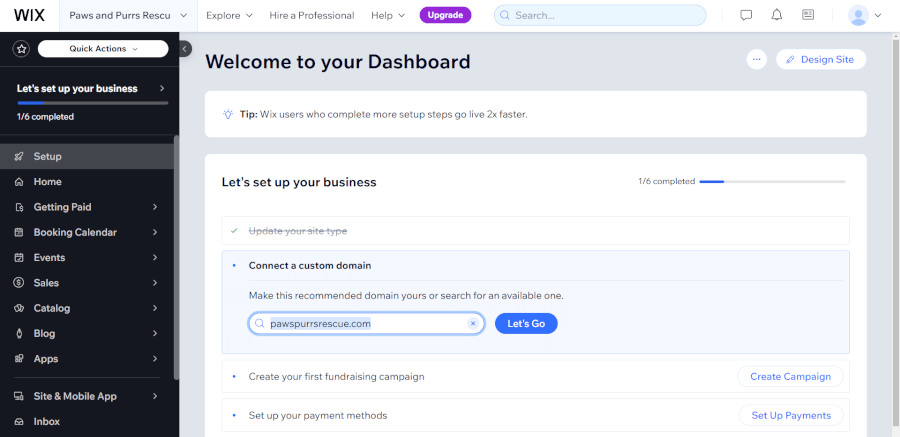
Wix’s dashboard feels like a digital design studio. It’s colorful, clean, and built for creators. Everything is organized in a sidebar: SEO, analytics, design tools, apps, you name it. What’s great is how proactive the platform is — it nudges you to improve your site, add content, or optimize for search.
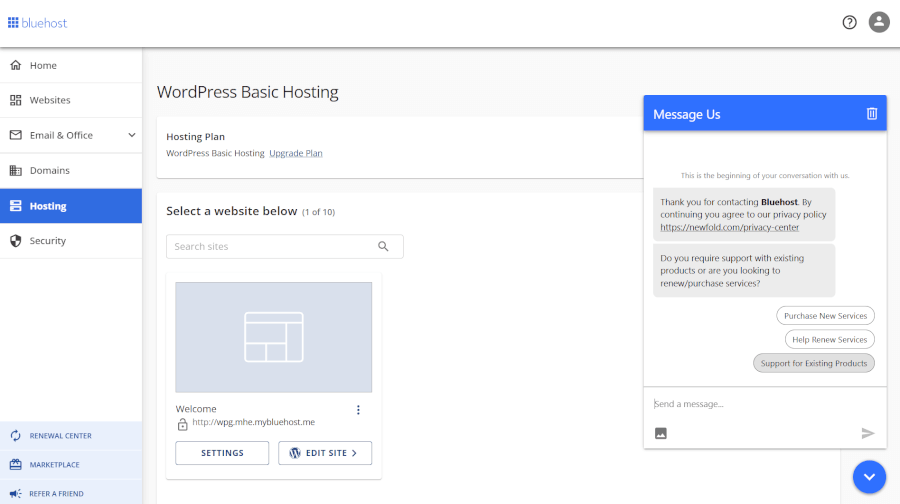
Bluehost gives you a solid, no-frills experience rooted in cPanel, with its own beginner-friendly twist. Their custom control panel simplifies hosting management, while WordPress WonderSuite (an AI assistant) walks you through creating and customizing your site. For WordPress fans, this combo offers a lot more flexibility, especially if you want to dig into themes, plugins, or custom code.
Drag, drop, or WordPress magic? Wix and Bluehost go head-to-head

Wix is the king of creative freedom. Its classic Editor lets you drag, drop, and rearrange every element exactly how you want it — no grid restrictions, no coding required. If you want to go faster, Wix ADI builds your site in minutes using AI. Bonus: it’ll even suggest layouts, write content, and fine-tune SEO elements.
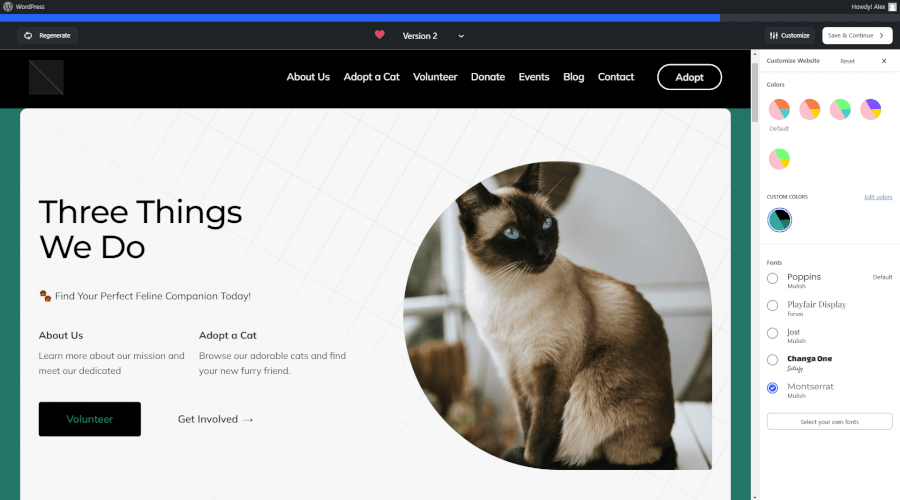
Bluehost doesn’t include a built-in website builder by default (though you can add one), but it truly shines when paired with WordPress, the world’s most popular CMS. That means access to thousands of themes, powerful plugins, and complete design freedom—perfect if you’re comfortable getting a bit more hands-on.
For those who prefer a simpler path, Bluehost also offers its own AI-powered WonderSuite builder. Just describe the kind of site you want, and the AI will generate ready-made designs to get you started fast. It’s a great way to skip the overwhelm and jump straight into editing with WordPress’s visual tools. There’s also a basic Bluehost website builder available, but it’s not as polished or flexible as Wix’s all-in-one solution.
Flexibility, migration, and customization
Wix is fantastic — if you’re starting from scratch. But once your site’s built, it’s hard to move. You can’t migrate content from other platforms (or even between Wix accounts), which is a major limitation if you ever want to switch providers.
Bluehost, however, supports site migration, including a free WordPress migration service. Want to bring over your existing blog or store? No problem. That flexibility is a big win if you’re growing a site long-term or moving from another host.
Who wins on user-friendliness — Wix or Bluehost?
If you want to launch a sleek website fast without touching a single line of code, Wix is your no-brainer winner — its drag-and-drop editor and AI tools practically build the site for you. But if you’d rather roll up your sleeves and dig into WordPress plugins, themes, and deeper customization, Bluehost gives you the control you crave. It all comes down to this: Do you want to build with clicks or configure with tools? Either way, both make the web-building journey surprisingly smooth.
Performance and reliability
When it comes to keeping your site running smoothly and loading quickly, both Wix and Bluehost bring serious game, but with very different strategies under the hood.
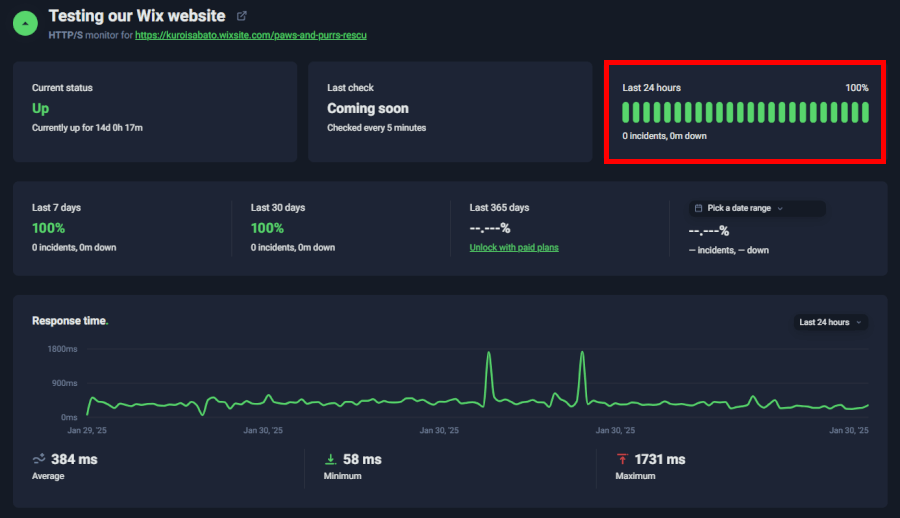
Wix runs on a global infrastructure that includes 11 data centers and over 200 CDN nodes, and it shows. In our tests, our Wix site boasted 100% uptime via UptimeRobot and handled high traffic loads with ease, thanks to built-in auto-scaling.
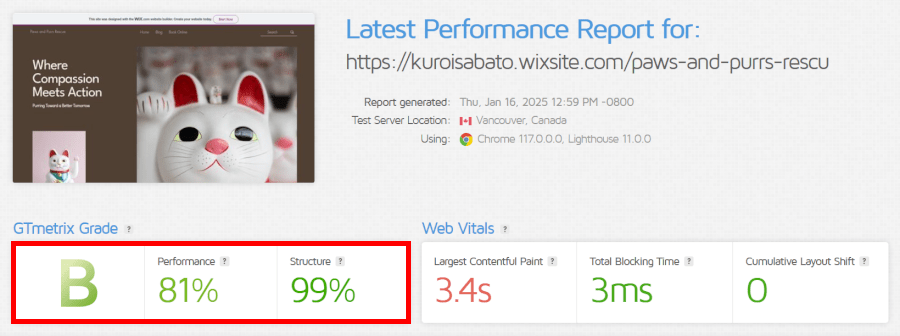
Menwhile, GTmetrix rated it a solid B, with load times hovering around 2.3 seconds. That’s more than acceptable for most small-to-medium sites, though it’s not exactly lightning-fast.
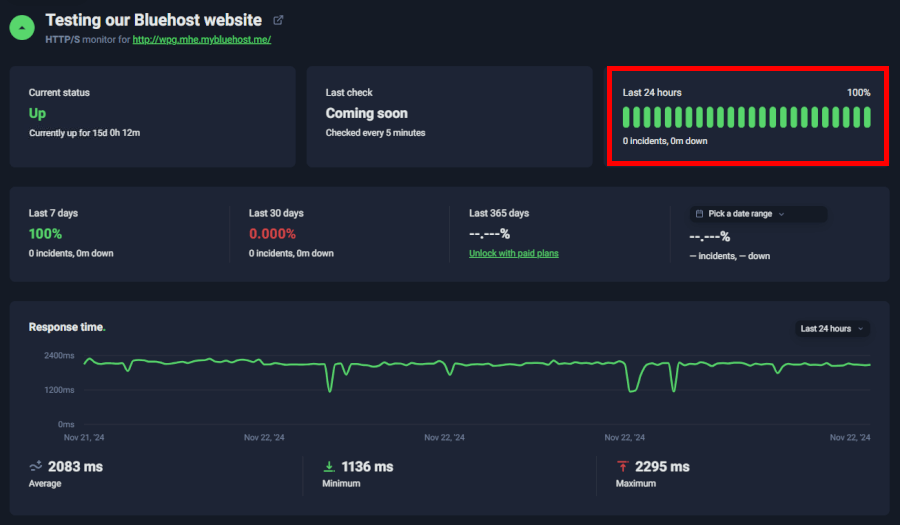
Bluehost, on the other hand, leans into performance with NVMe storage, optimized CPU resources (on higher plans), and a slick integration with Cloudflare CDN.
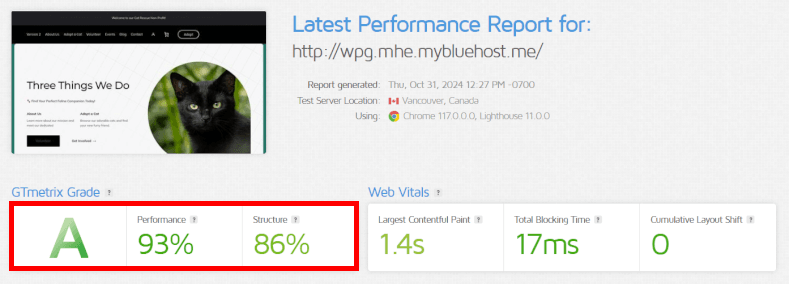
Our Bluehost test site also hit a 100% uptime rating and edged ahead in speed tests, scoring an A on GTmetrix with load times closer to 1.4–2.1 seconds. The difference may seem small, but every second counts, especially when SEO and conversions are on the line.
Both platforms are impressively stable, but Bluehost has the edge when it comes to raw speed. If your site relies on fast loading — say, for e-commerce or SEO-heavy content — Bluehost might just be the performance pick. That said, Wix’s no-fuss reliability and seamless scaling make it a strong contender for users who value peace of mind over page speed bragging rights.
Security features: Who keeps your website safer — Wix or Bluehost?
Whether you're running a personal blog, an online store, or a full-on business website, security isn't optional—it's essential. The good news? Both Wix and Bluehost bring solid security to the table, though they go about it in different ways.
| Security feature | Wix | Bluehost |
| Free SSL certificate | ✅ (across all plans) | ✅ (included with all plans) |
| Backups | ✅ (automatic site backups) | ✅ (daily, included with higher-tier plans) |
| DDoS protection | ✅ (built-in) | ✅ (network-level) |
| Malware protection | ⚠️ (not specified) | ✅ (malware scanning and server monitoring) |
| Secure transactions (e-commerce) | ✅ (secured checkout system) | ✅ (enhanced e-commerce protection with WooCommerce plans) |
Wix keeps it simple but effective. Every Wix site comes with a free SSL certificate and automatic site backups built-in, so you don’t have to lift a finger to keep your data safe. Their infrastructure is designed with security in mind, including built-in DDoS protection and secure payment gateways for e-commerce. It's all quietly running in the background while you focus on designing your site. Plus, Wix handles hosting for you, which means no worrying about patching vulnerabilities or server configuration — Wix takes care of it.
Bluehost, meanwhile, gives you a little more control. Like Wix, it includes a free SSL certificate on all plans, but it goes further with daily backups, malware scanning, and 24/7 server monitoring. Bluehost also offers SSH access, allowing advanced users to manage files securely via command line. For WordPress users, Bluehost makes it easy to add extra security plugins like Wordfence or Jetpack, giving you more flexibility and layered protection. And if you're running an online store with WooCommerce, Bluehost includes enhanced security features tailored to secure transactions and sensitive customer data.
So, who wins the security showdown? Wix is the hands-off option — it manages everything for you and does a great job at it. If you’re someone who’d rather not think about security settings at all, Wix has your back. Bluehost, on the other hand, gives you more control and customization — ideal for users who want to go under the hood and strengthen their site’s defenses further.
Customer support: Who's got your back when things go wrong?
When your website hits a snag, solid customer support can make all the difference — and here’s where Wix and Bluehost go head-to-head. We tested both platforms to see how helpful they really are when you're in a pinch.

Bluehost shines with its 24/7 live chat and phone support, which includes dedicated lines for different regions. We got through to a real human quickly, and while the chatbot asked a few questions first, it didn’t slow us down much. For WordPress users in particular, Bluehost also offers its premium “Blue Sky” service, which gives you access to WordPress experts for everything from setup to advanced optimization. Add in a huge knowledge base and tutorial library, and Bluehost makes it easy to find help, whether you’re talking to someone or troubleshooting on your own.

Wix, on the other hand, offers 24/7 callback support in English — no sitting on hold, they’ll call you. And their help center is one of the most thorough we’ve seen, packed with guides, videos, and tutorials you can access right inside the editor. Their AI-powered chatbot can be surprisingly helpful, pointing you to exactly what you need — but it can’t always replace a human conversation. If you want instant answers from a live agent via chat, you’ll have to catch them during limited hours. And oddly, there’s no email support, which feels like a miss for users who prefer written communication.
E-commerce capabilities, SEO, and marketing tools: Wix vs Bluehost in the online tools arena
Whether you're launching a side hustle or scaling a full-blown store, both Wix and Bluehost bring plenty to the e-commerce table — but they cater to different styles of selling.
| E-commerce feature | Wix | Bluehost |
| Starting price | $29/month (basic e-commerce) | $7.95/month (e-commerce essentials) |
| Products allowed | Up to 50,000 | Unlimited with WooCommerce |
| Transaction fees | ✅ (2.9% of the transaction amount + $0.30) | ❌ (gateways like PayPal/Stripe used freely via WooCommerce) |
| Payment gateways | Wix Payments and 50+ others | WooCommerce supports 20+ gateways, including PayPal, Stripe, and Razorpay |
| Abandoned cart recovery | ✅ (included) | ✅ (available via plugins) |
| Inventory management | Advanced | Advanced (via WooCommerce) |
| Third-party integrations | Large app market (500+ apps) | Massive WordPress plugin library and WooCommerce extensions |
| SEO tools | SEO Assistant, meta tags, redirects, mobile editor | Yoast SEO and WordPress tools bundled in premium plans |
| Mobile optimization | ✅ (full editor) | ✅ (responsive themes and customizer options) |
Wix makes setting up an online shop feel like stacking building blocks. With drag-and-drop simplicity, you can design product pages, add carts and payment options, manage inventory, and even offer discount codes without ever touching code. It's a dream setup for beginners who want a sleek, no-fuss storefront.
And with built-in SEO tools — from custom meta tags to instant Google indexing — Wix helps get your shop noticed, too. Plus, their marketing tools (like Wix Email Marketing and social post creators) make it easy to engage customers without leaving the dashboard.
Bluehost takes the WordPress route, which means endless customization if you're willing to get a little more hands-on. Thanks to WooCommerce integration, Bluehost users can create powerful stores with features like advanced shipping, customer accounts, and subscription options.
The real power, though, is in flexibility — with access to thousands of plugins and themes, and even direct HTML/CSS edits, you can build something unique. SEO tools? WordPress has some of the best — think Yoast SEO and Rank Math. And for marketing, you can tap into powerful tools like Mailchimp, HubSpot, and more.
Bluehost vs Wix showdown: Which platform wins in 2025?
After testing everything from pricing plans to page speed, one thing’s clear — both Wix and Bluehost have their strengths. But depending on your goals (and how hands-on you want to get), one might just fit you better.
Here’s how things stacked up:
- Pricing and plans: Bluehost – With long-term value and room to scale, Bluehost’s tiered pricing gives you more bang for your buck.
- Ease of use: Wix – It’s the king of simplicity. The drag-and-drop builder and AI tools make getting online a breeze.
- Performance and uptime: Bluehost – Faster load times and strong performance give it the edge, especially for SEO and traffic-heavy sites.
- Security features: Bluehost – More advanced tools and flexibility make it the better option for users who want control over their site's safety.
- Customer support: Bluehost – Around-the-clock help via live chat and phone makes it a more dependable choice.
- E-commerce, SEO & marketing: Tie – Wix wins for quick, no-fuss setups and built-in tools. Bluehost is your go-to if you want plugin freedom and WordPress flexibility.
So, who’s the real winner?
Wix is your best bet if you want a gorgeous site up and running fast, no tech skills required. It’s perfect for creatives, small business owners, and anyone who wants to skip the setup stress.
Bluehost is the better fit if you’re playing the long game — whether you’re building a blog empire or launching a full-scale online store. Its WordPress integration, fast speeds, and hands-on tools make it a powerhouse for growth.
Whether you want simple or powerful, you’ve got the perfect pick in your pocket.
Wix vs Bluehost FAQ
Which is better for beginners, Wix or Bluehost?
Wix is the clear winner for beginners. Its drag-and-drop editor, AI site builder, and pre-designed templates make getting started feel almost effortless. You don’t need to touch a line of code. Bluehost, on the other hand, is better suited for users who are comfortable navigating WordPress or want more flexibility to customize their site from the ground up.
Is Wix cheaper than Bluehost?
Not exactly. Wix’s pricing starts higher than Bluehost’s shared hosting plans, especially if you’re looking to sell online. Bluehost tends to offer more budget-friendly starter plans, but keep in mind that its true power comes from WordPres, which may involve extra setup time and plugins. So it’s a tradeoff between simplicity (Wix) and long-term value (Bluehost).
Can I set up an e-commerce store on both Wix and Bluehost?
Yes, and it depends on your style. Wix is great for launching an online store fast, with built-in features like product pages, payment gateways, and abandoned cart recovery. Bluehost gives you more freedom through WordPress and WooCommerce, which is ideal if you want full control over your store’s design and functionality. In short: Wix is simpler, Bluehost is more flexible.
Can I use WordPress with Wix or only with Bluehost?
You’ll need Bluehost if you want to use WordPress. Wix is a standalone platform with its own website builder — no WordPress needed or supported. Bluehost, however, is built for WordPress and gives you access to thousands of plugins, themes, and customizations. It’s the go-to if WordPress is a must for your site.
Which platform has better uptime and reliability?
Both are reliable, but Bluehost has a slight edge in speed. In our tests, Wix delivered flawless uptime and handled traffic spikes well, thanks to its global infrastructure and automatic scaling. Bluehost matched that with 100% uptime in our tests and also loaded pages faster, which can be crucial for SEO or high-traffic sites. You’re in good hands with either, but if you’re chasing speed, Bluehost pulls ahead.

Leave a Reply